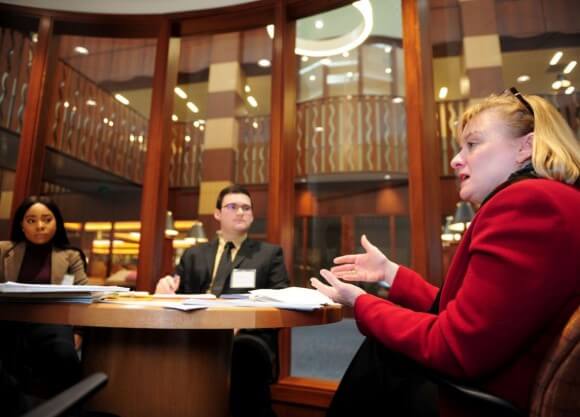
Hitting the ground running
October 27, 2016

October 27, 2016

Eighty first-year law students raised their noses from their books for three days in January to experience how it might feel to work on two cases, with real-life demands from real partners.
While the cases were fictional, the 60 individuals who volunteered to play the roles of partners and senior associates came from prominent law firms based in Connecticut and beyond. The opportunity to work with them was offered during a unique "Bridge to Practice" program held at the School of Law.
On the first day, students were assigned to 20 "small law firms." They tackled the drafting of a waiver of claims clause in a membership agreement for a fictional client who wanted to open a fitness center in Connecticut and save legal fees by using an agreement from a fitness center in New Jersey.
The tasks involved researching the appropriate law, evaluating the contractual language, coming up with ways to protect the potential new client and then making both oral presentations and written memos to their assigned partners. Day two involved the case of a "client" seeking to sue for injuries he sustained at a fitness center.
Dean Jennifer Brown said the program was designed to immerse the law school's newest students in the problem-solving approach to lawyering and highlight the ways lawyers make practical use of the theories and doctrines learned in class.
"We wanted to disrupt the usual routine of the first year and help them not only to see the light at the end of the first-year tunnel, but to show them that the complexities of law practice require a complex set of skills and orientations, only some of which are taught and tested that first year," Brown said.
She noted that the legal profession requires use of the "head, heart and gut" as well as the ability to collaborate and connect.
That theme was echoed by a panel of six prominent legal practitioners who tackled the question of what makes a good lawyer. The panel was moderated by Joette Katz, former state Supreme Court justice and current commissioner of the state Department of Children and Families. She was joined by Judge Victor Bolden of the U.S. District Court; Susan Nofi, executive director, New Haven Legal Assistance Association; Michael McGarry, deputy chief, financial fraud and public corruption unit of the U.S. Attorney's Office; Ivy McKinney, deputy general counsel and chief ethics officer at Xerox; and Lou Pepe, a senior partner at McElroy Deutsch Mulvaney & Carpenter.
One of the most vital things a lawyer can do is protect his or her reputation, said Pepe. "If you don't have your reputation, you have nothing," he said. You affect others' lives as an officer of the court, and you need credibility and integrity when appearing before judges."
McGarry prosecutes criminal cases, mostly white collar, working with federal agents and police officers. He related that he thinks of himself as a student who is always learning. For example, he said a lawyer may need to increase his knowledge about the hedge fund business to understand what the accused did, then serve as a teacher to explain to a judge or jury what law was violated or how a contract was breached.
Quinnipiac School of Law Professor Brad Saxton and Shelley Sadin, associate dean of professional and career development, coordinated the program along with Carrie Kaas, associate professor of law, and Bob White, a senior partner at Murtha Cullina.
Saxton noted that the practicing bar is urging law schools to graduate students who are more practice-ready, with a better sense of how to apply what they are learning. He added that the three-day "January term" program "produced many 'aha' moments when students really appreciated that what they are learning in class eventually will apply to real people."
A side benefit to the program, he said, is the relationships students may form with future employers who may one day offer them internships, summer jobs or permanent positions.
"We wanted to disrupt the usual routine of the first year and help them not only to see the light at the end of the first-year tunnel, but to show them that the complexities of law practice require a complex set of skills and orientations, only some of which are taught and tested that first year." said Jennifer Brown, dean of the School of Law
Quinnipiac Today is your source for what's happening throughout #BobcatNation. Sign up for our weekly email newsletter to be among the first to know about news, events and members of our Bobcat family who are making a positive difference in our world.
Sign Up Now